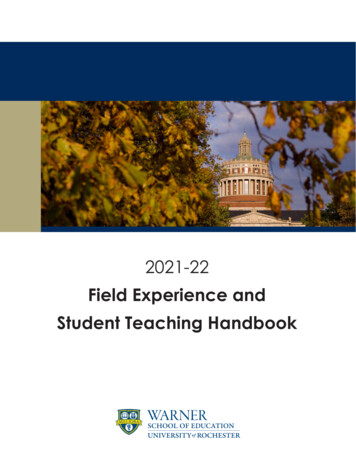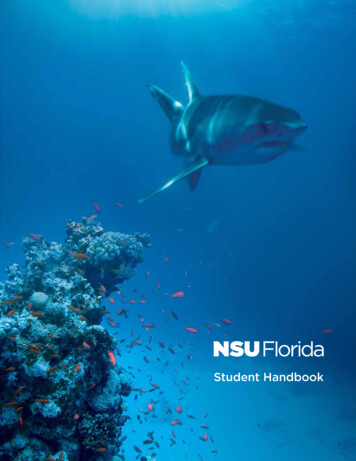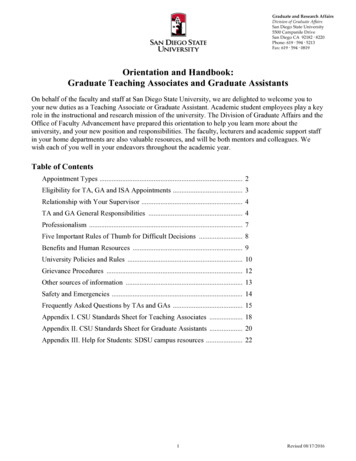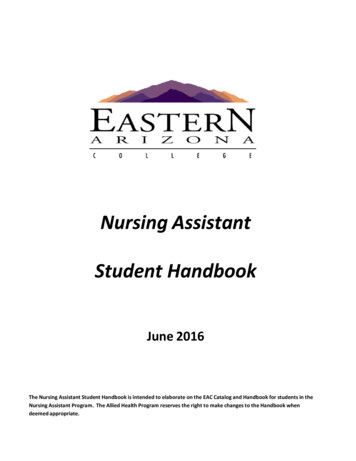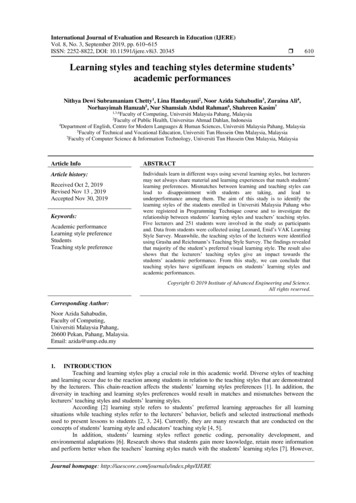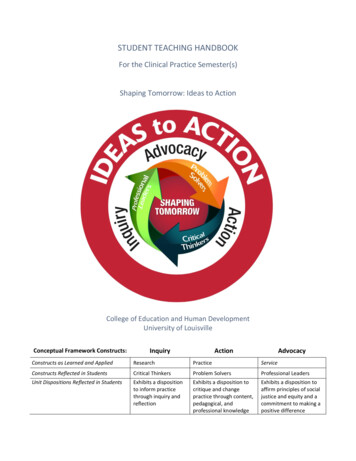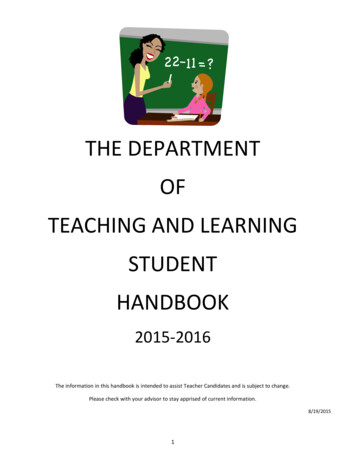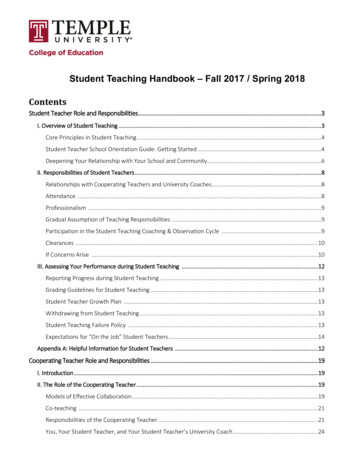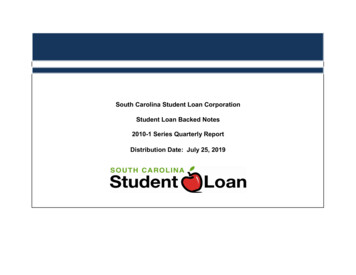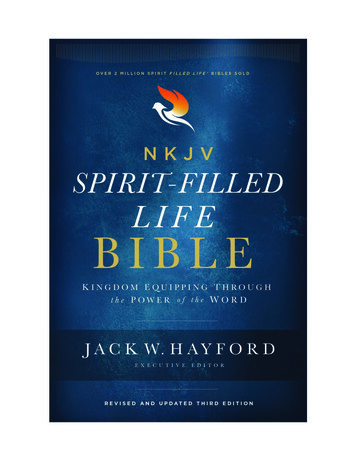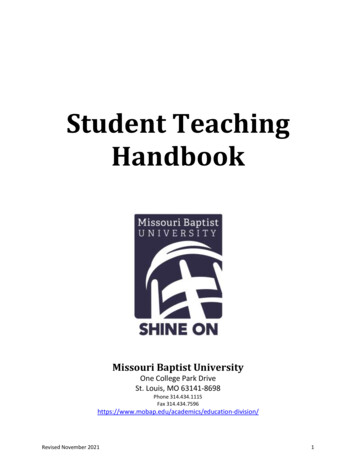
Transcription
Student TeachingHandbookMissouri Baptist UniversityOne College Park DriveSt. Louis, MO 63141-8698Phone 314.434.1115Fax ion-division/Revised November 20211
ForwardDear Student Teacher Candidate,This handbook purposefully accompanies exciting and culminating landmarks within your teaching endeavors!Importantly, the MBU School of Education faculty created the document to enhance your journey from pre-serviceobserver through the intense challenges you encounter as pre-teaching practice (field experience) to the ardentachievement you accomplish with fulfillment of student teaching.We sincerely congratulate your progress and envision the minute-by-minute effort applied to each lesson’s‘reflective’ closure. All ‘degree-seeking’ classes converge as you combine scholarship, integrity, caring, flexibility,and determination in order to switch from ‘learning the teacher’ (as you completed each course) to ‘teaching thelearner’ as you instruct each child. Wow!The success of your instruction also results from your practiced ‘professional enjoyment’ of every teachingopportunity. These numerous opportunities happen with the ‘teacher personality’ you continuously display.Enthusiastic greetings, genuine smiles, sincere praise, affective listening, a mature ‘posture’, credible expectations,and empathy with dignity begin to establish the exchange of trust and mutual respect needed for your classroom’sclimate and each student’s daily progress.At the first suitable circumstance, your initial- and continued- involvement in a component of each student’slearning experience and activity confirms your intention to discover how that individual eagerly grasps what youintend to teach. This involvement confirms your regard for uniqueness and diversity.As each day concludes, remember (Yes! Each day concludes!) to dedicate renewed ‘exit enthusiasm’ to positiveremarks that affirm knowledge learned, skill acquired, great ‘effort’ observed. Include comments that regard‘student as learner’ and ‘teacher as learner’ (you!). Students then leave your classroom, go home, and inform aparent that they want to come to school.Now, in reality, at this stage of your journey to become a certified teacher, you follow the lead of an experiencedCooperating Teacher. That wise professional shares strategies for success. Thus, a critical task of those importantfirst days becomes the observation and written record of those pedagogical, subtle, and overt techniques used tocreate a classroom climate of learning. Yes, write about them in a journal.In summary,1.2.3.4.You truly display care because you learn each student’s interests, needs, and strengths.You arrive prepared, even from the first day, to teach students.You model the importance of continuous learning by sharing your interests with students (i.e., a book youread, an application you acquired, a game you enjoy).As soon as possible, you create a respectful, trusting, and ‘safe haven’ for learning and welcome appropriateinteraction and personal expression.In Christ,Missouri Baptist University School of Education FacultyRevised November 2021Missouri Baptist University School of Education2
TABLE OF CONTENTSStatement of Mission and Purpose .5Commitment to Diversity .7Central Purpose of Missouri Baptist University .8Contact Information .9A Word on the Importance of Personal Reflection.10Student Teaching Information Links.11Field Experience and Student Teacher Placement Practices .12School of Education Spartan Academy .15Purpose of Handbook .16Purposes of Student Teaching.16The Student Teaching Program .17Placement .17Notification of Placement .17Supervision .17Student Teacher Candidate Expectations.18Preparation and Planning .18Openness and Acceptance .18Discipline and Classroom Management .19Attendance .19Professionalism .20Attire .20Inclement Weather .20Accident/Injury .20Social Media .20Revised November 2021Missouri Baptist University School of Education3
Substitute Teaching .20Termination of Placement .21Evaluation and Grading .21Student Teaching Course Load Limit Policy .21Recency Rule for Student Teaching .21Requirements – Student Teachers .22Requirements – All Pre-Service Candidates .22Role of the Cooperating Teacher .23Role of the Principal .25Role of the University Supervisor .26CPL Observation Requirements .29Instructional Planning .30MBU Lesson Plan .31MBU Lesson Plan Rubric .34Job Search Information .36Certification Information .37Assessment Requirements for Graduation and Certification .38Action Research Inquiry-Based Project .40Action Research Inquiry-Based Project Rubric .46Action Research Inquiry-Based Project Permission Form .49School of Education Writing Competencies Rubric .50Emergency Contact Information Form .51Revised November 2021Missouri Baptist University School of Education4
Statement of Mission and PurposeThe School of Education at Missouri Baptist University seeks to develop reflective, problem-solving, professionaleducators of excellence from a Christian perspective; to enhance the lives of students in the classroomintellectually, spiritually, physically, and socially; and to significantly influence students through the demonstratedintegration of Christian faith and learning in the classroom, so that they may become positive change agents in aglobally and culturally diverse society.This means more than simply valuing human diversity; it includes an imperative to promote equity and socialjustice and to intentionally prepare candidates to develop the knowledge bases, interpersonal skills, anddispositions for serving diverse populations. Preparing candidates to become agents of social change is consistentwith the Christian perspective and is reflected not only in the classroom, but also in field experiences in diversesettings. Based on its mission, the unit has undertaken the task of ensuring each candidate has experiences inschools with students from varied socioeconomic backgrounds, varied racial and ethnic groups, English languagelearners, and exceptional learners.The following nine standards serve as the guiding principles by which MBU’s educator preparation programs aremeasured:Missouri Baptist University prepares licensure candidates who:1. Consistently demonstrate the content, pedagogical, and pedagogical content knowledge necessary tofacilitate learning for all students, and to demonstrate the knowledge, skills, competencies, and dispositionsdefined as appropriate to their area of responsibility.2. Analyze and reflect on their practice using a variety of assessment strategies, including action research, andare committed to continued professional development.3. Observe and practice solutions to problems of practice in diverse clinical settings and with diverse PK-Grade12 student populations.4. Use their self-awareness and knowledge of diversity to create learning environments that support their beliefthat through active hands-and-mind-on learning, all students can learn challenging curricula.5. Demonstrate and promote the strategic use of technology to enhance learning and professional practice.Revised November 2021Missouri Baptist University School of Education5
6.7.8.9.Support schools, students, and community through leadership, service, and personal involvement.Develop effective and supportive relationships that enhance communication among students, parents, andcolleagues to facilitate learning.Exhibit empathy for and sensitivity to students and colleagues.Actively practice the profession’s ethical standards.Drawing from a rich combination of broad-based experiences and academic preparation, the professionaleducation faculty seeks to facilitate in each student:1. The development of an educational posture which is child-centered, experientially and authentically based,and consistent with a Christian perspective;2. The enhanced awareness of Christian moral and ethical responsibilities relative to education in a diverse andchanging society;3. The development of critical thinking and effective problem-solving skills through a variety of traditionaltechnologically-based experiences;4. The application of experiential and research-based theories into the pedagogical process.This program fosters in students a reflective and problem-solving heuristic (model) so that Missouri BaptistUniversity graduates are able to make informed decisions as professional educators.The program consists of a planned integrated system (pattern) of coursework and authentic learning (field)experiences designed to enable the student to acquire a strong knowledge base and core of subject competencies,as well as to develop constructive social and personal attitudes to serve as a reflective professional in theeducation field. To that end, all students seeking state certification within the School of Education at MissouriBaptist University are expected to know and to be able to demonstrate their competency.Those seeking initial certification to teach must demonstrate their competency in the nine (9) Missouri TeacherStandards as adopted by the Missouri State Board of Education.1. Content Knowledge Aligned with Appropriate Instruction2. Student Learning, Growth and Development3. Curriculum Implementation4. Critical Thinking5. Positive Classroom Environment6. Effective Communication7. Student Assessment and Data Analysis8. Professionalism9. Professional CollaborationThose seeking initial certification as a Library Media Specialist must demonstrate their competency in the seven (7)Missouri Standards for School Librarians as adopted by the Missouri State Board of Education.1. Teaching for Learning2. Reading and Literacy3. Information and Knowledge4. Leadership and Advocacy5. Program Management and Administration6. Technology Integration7. Professional DevelopmentRevised November 2021Missouri Baptist University School of Education6
MISSOURI BAPTIST UNIVERSITY’SCOMMITMENT TO DIVERSITYMissouri Baptist University is committed to maintaining a community that recognizes andvalues the inherent worth and dignity of every person. Missouri Baptist University affirms thatan important part of the integration of faith and learning is the recognition that all people arecreated in the image of God and worthy of respect and dignity. We seek to ensure that allstudents have full access to the educational, social, and spiritual growth opportunities that theUniversity provides to ensure that students understand and appreciate one of the University’score values, which is “social change through service and leadership.”Through its curricula and classroom experiences, the university seeks to develop and nurturediversity because it strengthens the organization, promotes creative problem solving, andenriches us all.The goal is to present materials and activities that are respectful of diverse groups including,but not limited to, race, gender, color, national or ethnic origin, age, qualified disability, militaryservice, learning differences, socioeconomic status, or genetic information.Revised November 2021Missouri Baptist University School of Education7
Central Purpose of Missouri Baptist University“Be diligent to present yourself approved to God, a worker who does not need to be ashamed,rightly dividing the word of truth.” II Timothy 2:15Central to Missouri Baptist University is its commitment to Christian (Biblical) principles to the glory ofGod and service to the community. Missouri Baptist University is an institution that acknowledges thatthe pursuit of excellence in its teaching, research, and quest for understanding God’s creation builds afoundation for academic success and life-long learning.Missouri Baptist University is an evangelical Christian, liberal arts institution of higher learning whosepurpose is to offer programs of study leading to professional certificates, undergraduate degrees, andgraduate degrees in an environment of academic excellence from a Biblically-based Christianperspective. The University is committed to enriching students’ lives spiritually, intellectually, andprofessionally, and to preparing students to serve in a global and culturally diverse society.The University seeks to prepare students who are motivated by ideals of service for effectiveperformance in careers that are appropriate to the Christian commitment of the University. TheUniversity is open to all qualified students, regardless of race, gender, national origin, religion, age, orqualified disability.Faculty and students work together toward the following purposes:1. To develop a personal philosophy of life and an ethical and spiritual commitment which is basedupon an awareness of alternatives and which is examined in the light of Biblical revelation.2. To grow in an understanding of themselves, as well as others, and to cultivate an ability to employthis knowledge for self-development, for mental and physical health, and for social and familyrelationships.3. To prepare for living in harmony with the physical environment by becoming aware of its basicprinciples, and of the means for intelligent use and conservation of its resources.4. To develop effectiveness in the use and understanding of communication, both spoken and written,employing analytical and logical thinking in the process.5. To become contributors to society in a manner consistent with Christian principles, participatingresponsibly in church, school, community, and world affairs, employing insights derived from a broadrange of studies.6. To grow in understanding, appreciation, and enjoyment of literature and the arts, and to becomeparticipants in creative and aesthetic activities in the community.7. To prepare for continuing study by becoming acquainted with electronic technology resources andmethods of scholarly research.Revised November 20218
Contact InformationOne College Park DriveSt. Louis, MO 63141Fax: 314.744.7656Dr. Tammy CoxDean – School of Education314.744.7694tammy.cox@mobap.eduDr. Kristy RobertsDirector of Teacher Education314.744.5339kristy.roberts@mobap.eduMr. Philip RaguskyDirector of Field . Kendra RayAdministrative Coordinator for Teacher Education & Field Experiences, School of Education314.485.8461kendra.ray@mobap.eduMrs. Angela McGowanTeacher Certification Coordinator314.744.5323angela.mcgowan@mobap.eduMs. Kathleen WendtDirector of Teacher Certification Advising314.392.2324kathleen.wendt@mobap.eduMrs. Jill CrainUndergraduate Education Advisor314.744.7625jill.crain@mobap.eduMrs. Grace GreenGraduate Advisor314.744.5381grace.green@mobap.eduRevised November 20219
A Word on the Importance of Personal ReflectionAs you are discovering, there are many facets to the education program. You have your regularMissouri Baptist University course work (including reading assignments, class projects, casestudies and other assignments), field experiences, MoGEA and MoCA, and finally, studentteaching. Too often, in the busyness of it all, the time to think and reflect is lost. The art ofreflection is one to cultivate because without this skill the depth of understanding into teachingcan be superficial.Instead, as you learn to take in the data right in front of you, your observations of yourCooperating Teacher (even your university professors) and the students in your classroom, andthe everyday routines of the school day, you will automatically tie them into theories oflearning as you analyze what has happened. This is where growth takes place, as you thinkthrough the day, make adjustments for improvement, and note what was powerful in yourteaching. Are the relationships I have with my students helping or hindering their ability to learn?Was my demeanor and attitude towards my class today effective for student teaching?Are my students excited about coming to my class today?Do my assessments really reflect learning, or merely task completion or memorizationskills?What new strategies have I tried lately that might benefit a student I am strugglingwith?What do I do when students are not learning in my classroom?What happens when I finish my lesson so early, I still have a lot of time left?What do I do with a disruptive student?Well, the questions just go on and on and the answers are found through the actual teachingact. From the time you meet the first student until the end of the first day, you will havealready mentally reflected on what went well and what did not. In essence, this is reflection.The valuable part is to write down your thoughts on what happened. Then analyze what wentwell and why. Likewise, analyze what did not go as well as you would have liked it to go andmake plans for improvement (utilize the expertise of your Cooperating Teacher and others inthe field). These active thinking acts are reflections.Revised November 202110
Student Teaching Information LinksLooking forGo to link belowRequirements for Student Teachers,Cooperating Teachers, and dated-July-2021.pdfSMSTA Membership Applicationhttps://www.msta.org/Join-MSTA Fingerprints & Background Information ov/safety/fcsr/Field Experience and Student TeacherPlacement cement-Practices-2021-05-17.pdfSubstitute Teacher certification/substitute-teachersLesson Plan design/ Missouri Content Assessments Missouri Learning Standards Missouri Teacher StandardsMissouri Standards for School standards g Teacher ised November 202111
FIELD EXPERIENCE AND STUDENT TEACHER PLACEMENT PRACTICESThe Missouri Baptist University School of Education is proud to be accredited by the Council for Accreditationof Educator Preparation (CAEP) and the Missouri Department of Elementary and Secondary Education(DESE). In order to maintain these accreditations, which are beneficial to our students, MBU must maintainconsistent practices with regard to placement of student teachers. Students requesting field experience andstudent teacher placements through MBU are hereby advised of the following field experience and studentteacher placement practices. Your understanding of and adherence to these practices will enhance theplacement process for students, school districts, and the Teacher Education Office staff responsible forsecuring the placements.1. Preparation for Student Teaching begins long before students ever reach the “student teaching” semester.Students should be aware that school district administrators carefully review students’ transcripts andphilosophies of education as part of the placement process. A few school districts now have a minimumGPA requirement of 3.0-3.5 for student teaching candidates. Students’ requests for student teacherplacement have been denied as a result of even just a few D’s and F’s on their transcripts, even when thosecourses were repeated and/or if they did not apply to the students’ education major. Students are highlyencouraged to be responsible for maintaining academic excellence in all coursework. This is especiallyimportant for professional education, field experience, and major content area requirements (for K-12,middle, or secondary majors), as a cumulative 3.000 GPA in professional education courses and in contentarea courses is required for certification.2. Missouri Baptist University strongly believes that the student teaching experience is vital to the student’sauthentic preparation for professional practice; therefore, students must be able to commit to studentteaching for an entire school day, Monday-Friday, for a full semester. Students seeking certification in asingle content area will complete one full semester teaching experience. Students seeking certificationat more than one level (K-12) or in more than one content area must student teach twelve weeks atone level or content area and four weeks at the other level or content area as approved by the Dean ofEducation or Director of Field Experiences. In addition, students are expected to attend Student TeachingSeminar concurrently in the semester in which they will be student teaching. Students are NOT excusedfrom Student Teaching Seminar due to contractual obligations with a school district or due to workschedules. Student Teaching Seminar is also NOT offered via “directed study.” Therefore, students shouldnot request permission to meet with the instructor individually at an alternate time. Students withcontractual obligations in a school district will need to either make arrangements with the school district toleave early, if necessary, on class dates, or may need to consider taking the class at a location that offers theclass at a later time during the day.3. Students must be fully admitted to the Teacher Education Program [including submitting and havingapproval for all required documents for the Teacher Education Admission Packet, passing scores on allsections of the required general education assessment (undergraduate degree-seeking students only), 3.00GPA in professional education and content areas (or higher for those districts which require a higher GPAfor student teacher placement), both interviews completed, and all probationary statuses from interviewscleared] by April 1 for Fall placements and by November 1 for Spring placements. Failure to be fullyapproved for student teaching by these dates will result in the student’s application for student teachingbeing moved to the following semester, which may delay the student’s graduation date, and/or eligibilityfor teacher certification. These deadlines are crucial to give the Teacher Education Office staff appropriatetime to request and confirm student teacher placements for students. For optimal placements, students areencouraged to complete all requirements to be approved for student teaching as early as possible in thesemester prior to student teaching, as many districts reach their capacity for student teacher requests bymid-semester. [Certain districts and/or schools (including Festus R-VI and Hillsboro Primary) haveestablished specific deadline dates for applications. Students should consult the School Districts ThatRequire Additional Information for Student Teaching Placement for more information.] Please be awarethat GPA requirements have changed. Students must have an overall cumulative GPA of 2.00 as wellas a content area GPA of 3.00 and a professional education GPA of 3.00 for middle, secondary, or K12 content areas or a 3.00 program GPA for early childhood, elementary, or special education (withno grades below a “C”) in order to be fully admitted and placed for student teaching. StudentsRevised November 202112
admitted under the previous 2.5 GPA requirement who did not complete certification requirementsprior to 8/1/2017 will be held to the new, higher GPA standard.4. Students must complete Teaching Field Experience I and Teaching Field Experience II in two differentdistricts. Early Childhood Stand-Alone candidates must complete one Field Experience in grades Pre-K/Kand one Field Experience in grades 1-3. Elementary Education candidates must complete one FieldExperience in grades 1-3 and one Field Experience in grades 4-6. Students seeking certification in bothEarly Childhood and Elementary Education should complete one Field Experience in Pre-K/K OR grades 13 and one Field Experience in grades 4-6. Those seeking K-12 or dual certification should complete FieldExperiences in Elementary and Middle/Secondary for K-12 certification or in appropriate gradelevels/subjects for each area of dual certification. Students enrolled in EDCL 211 Teaching Field ExperienceI must be concurrently enrolled in EDUC 210 Teaching Field Experience I Seminar. Students enrolled inEDCL 411/511 Teaching Field Experience II must be concurrently enrolled in EDUC 410/510 TeachingField Experience II Seminar. Successful completion of both seminar courses with a final grade of CR isrequired for degree completion and/or satisfaction of certification requirements.5. Students who will complete the traditional Field Experience II and student teaching must complete theirstudent teaching in a district different from their Field Experience I and II placements. Students will beplaced in the most highly diverse settings possible within MBU's geographic service area and shouldcarefully plan Field Experience and Student Teaching assignments accordingly. Students will not bepermitted to complete all of their Field Experience/ Student Teaching in the same district due to theirchildren's enrollment in that district or non-academic contractual employment in that district (such ascoaching, before or afterschool employment, bus driving duties, etc.). Students should consider theseobligations and make preparations as needed well in advance of applying for student teaching, so that theyare prepared for the various "life" adjustments that may be required during their student teachingexperience. Students may ONLY complete all of their student teaching in the same district if they areemployed by the district as a paraprofessional or on a Temporary Authorization or Provisional Certificate.In these cases, the student will be responsible for demonstrating sufficient experiences working withdiverse populations. In rare cases, the Education Office may approve a student to complete his/her s
Student Teaching Handbook Missouri Baptist University One College Park Drive St. Louis, MO 63141-8698 Phone 314.434.1115 . the pursuit of excellence in its teaching, research, and quest for understanding God’s creation builds
